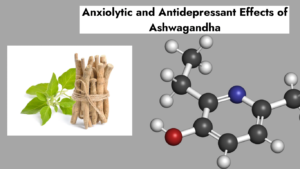Ashwagandha (Withania somnifera), a cornerstone of Ayurvedic medicine, has gained significant attention in modern health and wellness circles. Revered for its adaptogenic properties, ashwagandha is believed to help the body adapt to stress, promote vitality, and enhance overall well-being. In this blog, we will explore the scientific mechanisms behind ashwagandha, shedding light on how it exerts its effects on the body and mind.
What is Ashwagandha?
Ashwagandha, often referred to as “Indian ginseng” or “winter cherry,” is an herb native to India, the Middle East, and parts of Africa. Traditionally used to enhance energy, improve stamina, and support mental health, ashwagandha contains several bioactive compounds, including alkaloids, steroidal lactones (withanolides), and saponins, which contribute to its therapeutic effects.
Mechanisms of Action
1. Adaptogenic Properties of Ashwagandha

Ashwagandha is widely recognized for its adaptogenic properties, making it a significant herb in managing stress and promoting overall well-being. Here’s a closer look at how these adaptogenic qualities function and their implications for health.
What Are Adaptogens?
Adaptogens are natural substances that help the body adapt to stressors, whether physical, emotional, or environmental. They work by balancing the body’s systems, particularly the stress response, thereby enhancing resilience.
Mechanisms of Action
Modulation of the HPA Axis:
Hypothalamic-Pituitary-Adrenal (HPA) Axis: The HPA axis regulates the body’s response to stress. Ashwagandha influences this axis by lowering cortisol levels, the primary stress hormone. By doing so, it helps mitigate the physiological effects of chronic stress, such as anxiety and fatigue.
Cortisol Regulation:
High cortisol levels can lead to various health issues, including weight gain, insomnia, and impaired immune function. Ashwagandha helps to normalize cortisol levels, promoting a healthier stress response and supporting overall hormonal balance.
Nervous System Support:
Ashwagandha enhances the body’s ability to cope with stress by supporting the nervous system. It has been shown to reduce anxiety and promote a sense of calm, partly through its influence on neurotransmitters like serotonin and GABA, which regulate mood and relaxation.
Antioxidant Effects:
Chronic stress increases oxidative stress in the body, leading to cellular damage. Ashwagandha’s antioxidant properties help neutralize free radicals, protecting cells and reducing the physical toll of stress.
Immune Function Enhancement:
Stress can weaken the immune system. Ashwagandha enhances immune response by stimulating the production of immune cells, helping the body better withstand stress-induced immune suppression.
Benefits of Adaptogenic Properties
-
Stress Reduction:
Regular use of ashwagandha has been associated with lower stress levels and reduced symptoms of anxiety. This can lead to improved mental clarity and overall mood. -
Improved Energy and Vitality:
By managing stress and regulating cortisol levels, ashwagandha can enhance energy levels and combat fatigue, making it beneficial for those feeling overwhelmed or drained. -
Better Sleep Quality:
Its calming effects contribute to improved sleep quality, helping individuals who struggle with insomnia or disrupted sleep patterns due to stress. -
Enhanced Cognitive Function:
By reducing anxiety and promoting a balanced mood, ashwagandha can support better focus, memory, and cognitive function.
2. Anxiolytic and Antidepressant Effects

Ashwagandha (Withania somnifera) has gained popularity not only for its adaptogenic properties but also for its significant anxiolytic (anxiety-reducing) and antidepressant effects. This ancient herb offers a natural approach to managing anxiety and depression, making it a valuable addition to mental health support.
Mechanisms of Action
Cortisol Regulation:
Ashwagandha helps lower cortisol levels, the body’s primary stress hormone. Elevated cortisol is associated with anxiety and depression. By regulating cortisol, ashwagandha mitigates the physiological effects of stress, promoting a more balanced emotional state.
Neurotransmitter Modulation:
The herb influences several key neurotransmitters, particularly serotonin and gamma-aminobutyric acid (GABA). Serotonin is crucial for mood regulation, while GABA has calming effects on the nervous system. By enhancing the activity of these neurotransmitters, ashwagandha can help alleviate symptoms of anxiety and depression.
Reduction of Neuroinflammation:
Chronic inflammation in the brain has been linked to mood disorders. Ashwagandha’s anti-inflammatory properties can help reduce neuroinflammation, supporting overall brain health and improving mood.
Antioxidant Properties:
The antioxidant activity of ashwagandha helps combat oxidative stress, which is associated with neurodegenerative diseases and mood disorders. By protecting neurons from oxidative damage, ashwagandha supports cognitive and emotional health.
Adaptogenic Effects:
As an adaptogen, ashwagandha helps the body adapt to stressors. This can lead to a more resilient emotional state, reducing the likelihood of anxiety and depressive episodes triggered by stress.
Benefits of Anxiolytic and Antidepressant Effects
-
Reduction in Anxiety Symptoms:
Studies have shown that ashwagandha can significantly reduce anxiety levels in individuals with generalized anxiety disorder (GAD) and stress-related conditions. Users often report feeling calmer and more composed. -
Improved Mood:
Regular consumption of ashwagandha has been associated with improvements in mood and reductions in depressive symptoms. Its ability to balance neurotransmitters contributes to a more stable emotional state. -
Enhanced Stress Resilience:
By regulating the stress response and promoting a sense of calm, ashwagandha enhances resilience to everyday stressors, making it easier to cope with life’s challenges. -
Better Sleep Quality:
Improved mood and reduced anxiety often lead to better sleep quality, as ashwagandha helps alleviate insomnia and disturbances related to stress and anxiety.
3. Immune System Modulation

Ashwagandha (Withania somnifera) is well-known for its adaptogenic properties, but it also plays a significant role in modulating the immune system. This ancient herb not only helps the body manage stress but also enhances immune function, making it a valuable tool in promoting overall health.
Here’s a closer look at how ashwagandha affects the immune system.
Mechanisms of Immune Modulation
Stimulation of Immune Cells:
Ashwagandha has been shown to enhance the activity and proliferation of various immune cells, including lymphocytes (T-cells and B-cells) and macrophages. These cells play crucial roles in the body’s defense against pathogens and are essential for a robust immune response.
Anti-Inflammatory Properties:
Chronic inflammation can lead to immune dysfunction and a range of health issues. Ashwagandha possesses anti-inflammatory compounds that help reduce inflammation in the body, supporting a balanced immune response. This is particularly beneficial for conditions linked to chronic inflammation, such as autoimmune disorders.
Enhancement of Antioxidant Defense:
The herb boosts the body’s antioxidant capacity, which is vital for neutralizing free radicals and reducing oxidative stress. Oxidative stress can compromise immune function, so ashwagandha’s antioxidant effects help protect immune cells and enhance their effectiveness.
Cytokine Regulation:
Ashwagandha influences the production of cytokines, which are signaling proteins that regulate immune responses. By promoting a healthy balance of pro-inflammatory and anti-inflammatory cytokines, ashwagandha helps maintain immune homeostasis.
Support for Gut Health:
A significant portion of the immune system is located in the gut. Ashwagandha may help promote a healthy gut microbiome, which is essential for optimal immune function. A balanced gut flora contributes to the body’s overall immunity and resilience against infections.
Benefits of Immune System Modulation
-
Enhanced Immune Response:
By stimulating the production and activity of immune cells, ashwagandha can help the body respond more effectively to infections, reducing the risk of illness. -
Reduced Inflammation:
Ashwagandha’s anti-inflammatory properties help manage chronic inflammation, which can lead to improved immune function and a lower risk of developing autoimmune diseases. -
Support During Stress:
Chronic stress can weaken the immune system, making individuals more susceptible to illness. Ashwagandha helps mitigate the effects of stress on immune function, promoting resilience and better health outcomes. -
Potential Protection Against Infections:
By enhancing the body’s immune response, ashwagandha may offer protection against various infections, including viral and bacterial pathogens.
4. Hormonal Balance

Ashwagandha (Withania somnifera) is not only celebrated for its adaptogenic and neuroprotective properties, but it also plays a significant role in promoting hormonal balance. This is particularly important in today’s fast-paced world, where stress and lifestyle factors can disrupt hormonal harmony. Here’s a detailed look at how ashwagandha influences hormonal health.
Mechanisms of Hormonal Balance
Cortisol Regulation:
Ashwagandha is well-known for its ability to lower cortisol levels, the primary stress hormone. Chronic high levels of cortisol can lead to a variety of health issues, including weight gain, anxiety, and sleep disturbances. By regulating cortisol, ashwagandha helps to restore balance to the body’s stress response.
Thyroid Function Support:
Research indicates that ashwagandha may enhance thyroid hormone levels, particularly in individuals with subclinical hypothyroidism. It supports the production of thyroid hormones, which are essential for metabolism, energy levels, and overall hormonal balance.
Impact on Sex Hormones:
Ashwagandha may also influence levels of sex hormones, including testosterone and estrogen. Studies suggest that it can enhance testosterone levels in men, potentially improving libido, muscle strength, and overall vitality. In women, ashwagandha may help regulate menstrual cycles and alleviate symptoms of menopause.
Insulin Sensitivity:
Some research indicates that ashwagandha may improve insulin sensitivity, which can be beneficial for blood sugar regulation. This effect can help balance hormones related to metabolism and energy storage, reducing the risk of insulin resistance and associated metabolic disorders.
Adaptation to Stress:
By supporting the body’s ability to adapt to stress, ashwagandha helps maintain balance among various hormones, preventing the hormonal fluctuations that often accompany chronic stress.
Benefits of Hormonal Balance
-
Improved Mood and Mental Clarity:
By regulating cortisol and supporting neurotransmitter balance, ashwagandha can enhance mood, reduce anxiety, and promote mental clarity. -
Increased Energy and Vitality:
Balanced cortisol and thyroid hormones contribute to higher energy levels and improved overall vitality, making it easier to manage daily activities and exercise. -
Enhanced Reproductive Health:
For men, increased testosterone levels can lead to improved libido and fertility. For women, hormonal balance can help alleviate symptoms of PMS and menopause. -
Better Weight Management:
By regulating cortisol and improving insulin sensitivity, ashwagandha may aid in weight management, reducing cravings and promoting healthier metabolic function.
5. Enhanced Physical Performance

Ashwagandha (Withania somnifera) is increasingly recognized for its potential to enhance physical performance and improve overall fitness. This ancient adaptogenic herb offers a range of benefits for athletes and fitness enthusiasts alike. Here’s a closer look at how ashwagandha contributes to improved physical performance.
Mechanisms of Action
Increased Strength and Muscle Mass:
Research has shown that ashwagandha supplementation can lead to significant gains in muscle strength and mass. It promotes muscle recovery and growth, likely due to its effects on testosterone levels and muscle protein synthesis.
Improved Endurance:
Ashwagandha may enhance cardiovascular endurance and overall stamina. Studies suggest that it can improve aerobic capacity, allowing individuals to perform longer and more intensely during workouts.
Reduced Exercise-Induced Muscle Damage:
The anti-inflammatory and antioxidant properties of ashwagandha help mitigate exercise-induced muscle damage. By reducing oxidative stress and inflammation, ashwagandha supports faster recovery and less post-exercise soreness.
Enhanced Recovery:
Ashwagandha’s ability to lower cortisol levels is crucial for recovery. High cortisol can hinder recovery and lead to fatigue, but ashwagandha helps maintain a more balanced hormonal state, facilitating quicker recuperation after intense physical activity.
Boosted Energy Levels:
By improving thyroid function and supporting metabolic health, ashwagandha can enhance overall energy levels. This leads to better performance during physical activities and workouts.
Mental Focus and Motivation:
Ashwagandha can enhance mental clarity and reduce anxiety, which are essential for optimal performance. A calm, focused mind contributes to improved motivation and concentration during training.
Benefits for Athletes and Fitness Enthusiasts
-
Improved Athletic Performance:
Athletes may experience enhanced performance in strength training, endurance sports, and overall physical activities due to increased strength, endurance, and quicker recovery. -
Reduced Fatigue:
Ashwagandha’s ability to combat fatigue and improve energy levels allows individuals to train harder and for longer periods without excessive tiredness. -
Enhanced Recovery Times:
Faster recovery means less downtime between workouts, allowing for more consistent training and better results over time. -
Stress Management:
With its adaptogenic properties, ashwagandha helps manage stress levels, which can otherwise negatively impact performance and motivation.
Conclusion
Ashwagandha’s multifaceted mechanisms make it a powerful ally in promoting health and well-being. From its adaptogenic properties and neuroprotective effects to its role in hormonal balance and immune modulation, ashwagandha offers a holistic approach to managing stress and enhancing vitality. As research continues to unveil the intricacies of this ancient herb, it remains a relevant and valuable tool in both traditional and modern health practices. Whether you’re looking to alleviate stress, boost energy, or support overall health, ashwagandha could be a worthwhile addition to your wellness regimen.

